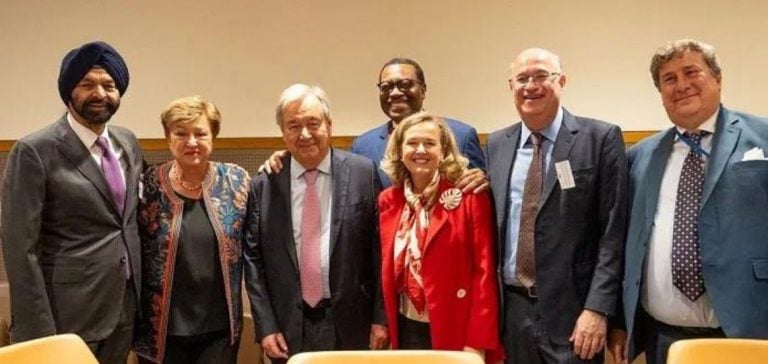The heads of the major multilateral development banks (MDBs) recently strengthened their commitment with the United Nations (UN) to accelerate efforts to achieve the Sustainable Development Goals (SDGs) by 2030.
These goals, set in 2015, are still struggling to be achieved, largely due to funding gaps. As the pandemic and geopolitical crises slow global investment, MDBs have adopted a proactive approach to bridging this gap, coordinating their actions and optimizing their ability to raise funds on advantageous terms.
The strategy meeting was attended by the heads of major international financial institutions, including the World Bank, the African Development Bank and the European Investment Bank (EIB).
Emphasis was placed on the need to release additional long-term resources, particularly for fragile countries and emerging economies.
The idea is not simply to allocate funds, but to maximize their impact through innovative mechanisms, including the private sector.
Key reforms to boost investment
Discussions focused on a number of structural reforms implemented within the MDBs to improve the efficiency of financing.
An important part of these reforms is aimed at reducing borrowing costs for low-income countries and stimulating private investment in sustainable development projects.
These adjustments, albeit technical, should strengthen the capacity of multilateral banks to finance critical infrastructure projects in sectors such as energy, transport and water resource management.
Another priority mentioned is the importance of using Special Drawing Rights (SDRs) – an international monetary tool issued by the International Monetary Fund (IMF).
SDRs are seen as a lever capable of supporting the allocation of capital to high-impact initiatives.
MDBs focus on models for redistributing these resources efficiently and transparently, particularly in sectors requiring urgent investment such as decarbonized energy and resilient infrastructure.
The importance of enhanced cooperation
In addition to internal reforms, the MDBs are working closely with the UN to align their strategies.
Discussions also focused on how to get private investors more involved.
This collaboration with the private sector is crucial, as public funds, while substantial, are far from sufficient to cover global sustainable development needs.
The private sector is therefore called upon to play a central role in mobilizing the resources needed to achieve the goals set by the SDGs.
Specific initiatives such as the Global Partnership for Sustainable Development (GSDP) or the Alliance against Hunger and Poverty (initiated by the G20) were cited as examples.
At the same time, MDBs are striving to strengthen their coordination, to avoid duplication of effort.
It is essential for each bank to ensure that its resources are directed towards projects that generate the greatest possible impact, while guaranteeing coherence with the global objectives of the United Nations.
To this end, particular emphasis has been placed on the world’s most vulnerable regions, notably sub-Saharan Africa, where access to financing remains limited.
Setting course for the Seville 2025 Conference
As part of their ongoing activities, the MDBs are preparing for the Fourth International Conference on Financing for Development (FfD4), scheduled for 2025 in Seville, Spain.
This major event will provide an opportunity for banks, governments, private companies and civil society organizations to assess the progress made and define the next steps.
One of the priority objectives of the conference is to accelerate the financing of projects linked to renewable energies, resilient infrastructure and the decarbonization of emerging economies.
To optimize this approach, the MDBs are counting on financial innovation, with the introduction of new financial instruments and closer partnerships with institutional investors.
The challenge will be to demonstrate that financing sustainable development projects can not only be profitable, but also crucial to mitigating the systemic risks associated with climate and economic crises.
Future prospects for sustainable financing
Recent exchanges between MDBs and the UN have therefore underlined the importance of a collective and strategic approach to overcoming the challenges of development financing.
The growing involvement of the private sector, coupled with the MDBs’ internal reforms, could be a game-changer when it comes to financing the MDGs.
This cooperative framework, if properly implemented, would not only bridge current financial gaps, but also establish a solid foundation for future crisis management.
As the Seville conference approaches, expectations are high, and the results of these initiatives will be closely scrutinized by both public and private sector players.






















